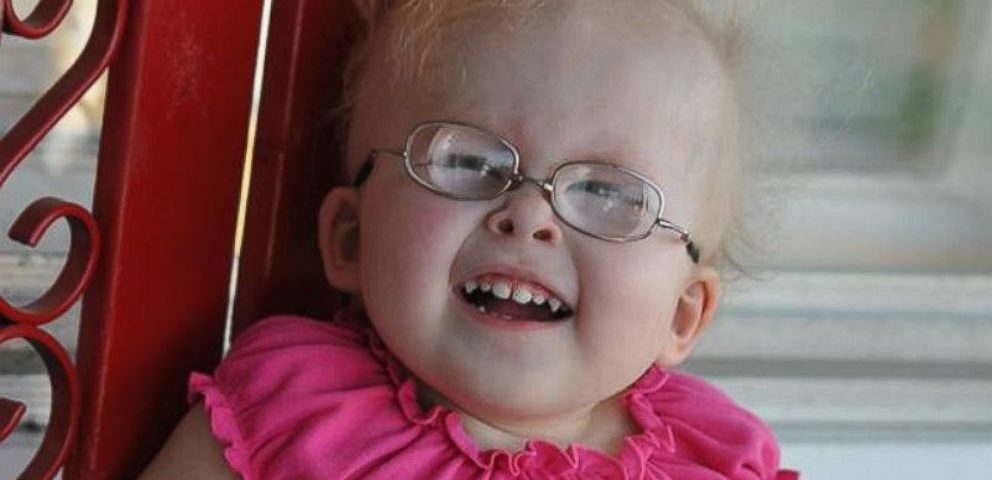
When she was born, doctors said Grace Anna Rodgers, a cherubic 3-year-old with blond curls and a “pistol” personality, would likely be deaf, and that her crushing scoliosis could impair her lung function.
Despite their dire predictions about her ability to hear, Grace has been singing since she was 16 months old. Not only is she a minor celebrity in in her hometown of Liberty, Ky., but in 2013, she became a YouTube sensation for her rendition of “The Star Spangled Banner.” The video has been seen by nearly 350,000 people around the world.
Grace has a rare form of dwarfism called Conradi-Hunermann, which means she’s short, and her legs are uneven in length. But there is nothing small about her voice.
Now her mother, Angie Rodgers, 40, has already been asked to have Grace sing at a veterans’ benefit in Kansas and at another event in Virginia. Rodgers said there was an even bigger project in the works that she couldn’t yet discuss.
So far, Grace, who is intellectually bright but cannot walk, has overcome just about every obstacle thrown at her. Her mother said Grace could sing even before she began to talk.
“Yesterday I got a call from a doctor who said he thought it would be hard for her walk,” said Rodgers, a middle-school science teacher. “I was told she would never hear very well. I have been told so many things that have proven to be wrong, so I take it with a grain of salt.”
Conradi-Hunermann syndrome is a rare genetic disorder characterized by skeletal malformations, skin abnormalities and cataracts, according to the National Organization for Rare Disorders. It is caused by an X-linked dominant trait that occurs almost exclusively in girls; boys born with the syndrome usually do not survive.
An estimated one in 400,000 newborns is born with the disorder. Symptoms and severity can vary among individuals, but cataracts, spinal curvature, sparse or coarse scalp hair and scaling of the skin are common.
Rodgers said she’d had three miscarriages before Grace was born and expected she would lose her too. When Rodgers was three months pregnant, doctors noticed skeletal anomalies in an ultrasound, which suggested dwarfism.
“Doctors tried to get us to abort her over five different times,” said Rodgers, who also has a 16-year-old son from a previous marriage. “It never was an option for us.
Born by cesarean section, Grace experienced meconium aspiration, a life-threatening condition that occurs when a baby inhales its first stool during or before delivery.
“I didn’t know if she would make it – they didn’t tell me anything,” said Rodgers. “I never saw her for the first 12 hours and when I did, she had scales on three-quarters of her body. The only place with no scales were her face and butt. They fell off in three months.”
Grace failed her hearing test and had detached retinas in her eyes. “Her back looked like a rainbow and bowed out,” said her mother. “Her vertebrae were shaped like triangles pushing into her spinal cord.”
According to a spokesperson for the Genetic and Rare Diseases Information Center, life expectancy for those with Conradi-Hunermann syndrome is no shorter or longer than for anyone else, “as long as you don’t have severe scoliosis that affects heart and lung function.”
Grace almost died in 2012 after complicated surgery to fuse her malformed spine when her lungs nearly collapsed. “There was something like shelving in her throat and they couldn’t even get a tube in her windpipe,” said Rodgers.”
She was in the hospital for 22 days and in a body cast for six months. But it was then, at about 16 months, that the little girl picked up a knack for singing.
“I would lay her head in my lap in bed and sing with her and she would play with my hair,” said Rodgers. “It seemed like she was bound and determined to sing and do nothing else.
“For someone who failed a hearing test, she sings well,” she said. “Summer rolled around and she was singing the whole first verse of ‘Amazing Grace’ – loud and proud. You know the line: ‘I was blind, but now can see.’”
Since then, Grace has had four eye surgeries for cataracts and glaucoma. Now, with her glasses, she can accurately read an eye chart.
“Her doctor is amazed by her – she’s a pistol,” said Rodgers, who wants the same life for her daughter as her teenage son enjoys. “Hopefully, she will have a relationship with God, which is a priority in our family, and some type of vocation she loves to do.”
“I don’t want her to think she can’t be successful in life,” she said. “Just because she has a disability, doesn’t mean she can’t dream big. She is very smart and just because she is very small, doesn’t mean she doesn’t have a purpose.”
